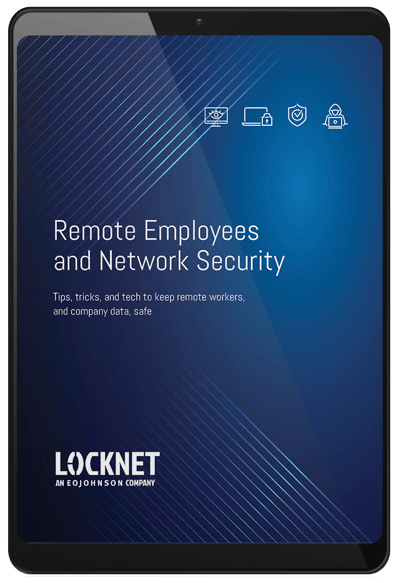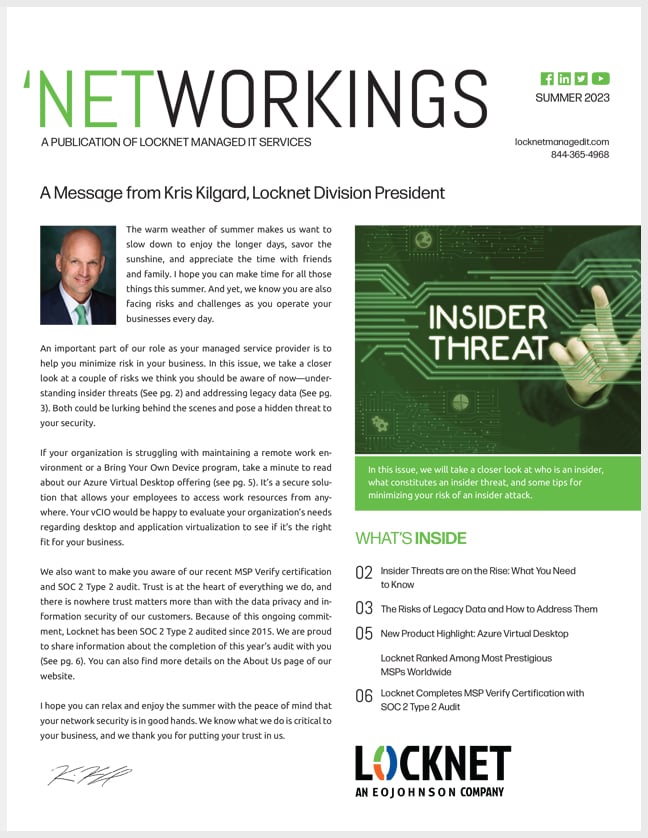What it is, what to look for, and how hackers do it
Social engineering is a favorite play in the hacker handbook. But what exactly is social engineering? What should you watch for to protect your network? And how exactly do hackers do it? The professionals at Locknet® Managed IT, part of EO Johnson Business Technologies, are experts at cybercrime, including social engineering. They've put together this guide to help demystify social engineering so you can better protect yourself, your data, and your network.
What is Social Engineering?
Social engineering is a tactic used by hackers to gain access to your data by tricking you into giving them the information they need. Often, victims are unsuspecting as attacks have gotten so sophisticated, they seem legitimate. Attacks may originate via any of your devices, email accounts, phone calls, text messages, or even U.S. mail. Determining what is, or might, constitute social engineering can be very tricky and requires cybercrime savvy and a keen eye. The stakes are among the highest: hackers who successfully land an attack can gain access to your finances, your personal information, your valuable company data, or your entire network. Simply put, everything is on the line, so it's essential that you and your employees fully understand not only what's at stake, but what to watch for.
It's essential to point out that social engineering focuses on tricking users rather than exploiting vulnerabilities in technology. The bottom line: security education is part of your first line of defense to protect what matters. Don't have a security education plan in place for your organization? We can help. Contact us to learn more about the options we provide for organizations that want to ensure their staff is up to date on the latest threats and know how to protect your business.
How hackers deliver social engineering attacks
Hackers, known in this instance as social engineers, try to gain access to your data through several approaches. Social engineering is often one of the cheapest and most effective methods at a hacker’s disposal. Here's an overview of the most common.
Phishing attacks and spear phishing
Through phishing, social engineers pretend to be a company or person you trust, in order to capture your passwords, usernames, and financial info. Phishing emails can often slip through even the best spam filters, and they are typically disguised brilliantly in look and design so that you believe they are originating from sites, accounts, companies, or individuals you know and trust. Phishing often includes an email sent in bulk. With spear phishing, hackers make a focused attack on you or your company. By the time they reach out to you, they've done their research and have details that can make them look even more legitimate, so you are more apt to give away your valuable information.
Social media impersonation
It's easy for social engineers to create profiles on social media that look like companies you trust, friends, or even celebrities. They can look extremely legitimate, so it can be a very effective approach to ensnaring unsuspecting victims into clicking on a link that installs malicious software on your device. It is usually easy for social engineers to learn who your friends are and companies you trust by simply viewing your social media accounts if they are unlocked.
CEO Fraud or Business Email Compromise
Social engineers know they can gain access to employees simply by impersonating C-Suite level staff. So, they've become adept at creating communications that look and sound like company leadership. Their end game is often to commit fraud and fill their pockets with wire transfer cash, thanks to help from unsuspecting workers.
Baiting
We all love free stuff, and that impulse can leave us vulnerable to baiting. Through baiting, cybercriminals offer something a potential victim will want—information on a falsely labeled USB drive left conveniently in the parking lot or lobby of a business, or a free download of a movie or other asset. In the process of taking advantage of these freebies, malicious software infects your system and leaves the door wide open to a network attack.
Rogue software
Rogue software leads users to believe it is a legitimate anti-malware, anti-spyware, or security software to trick them into shelling out cash for the "removal" of malware or security protection—which, in the end, not only doesn't deliver protection, but it actually ends up with a malware install.
Pretexting
Armed with real information about the potential victim, cyber criminals use pretexting to gain the trust of a potential victim and harvest even more valuable information about them. Pretexting often centers around a scenario the attacker has created to improve their chances of success. This can also include the classic “help me help you (help me)” where they seemingly try to be helpful, but the only ones they are really helping are themselves.
Social engineering: security training can protect you
It may surprise most business leaders to know that an organization’s staff can be their best security asset, rather than one of their biggest liabilities if they are properly trained and empowered. This empowerment is provided through regular security training, so that staff is confident and wise to these myriad types of social engineering attacks, and they know when to flag an attempt. Attacks are always evolving, and social engineers know exactly how to get the information they need. Having the right network security partner can ensure you are protected from these sophisticated attacks. Want to learn more? Reach out to learn about how we can customize a package for you that will protect you from social engineering attacks and all cyberthreats in the digital space today.









